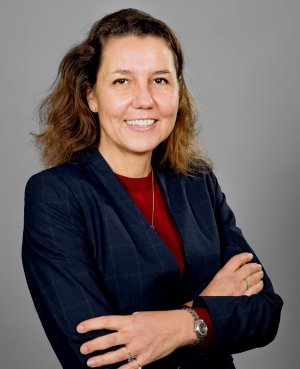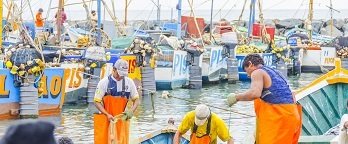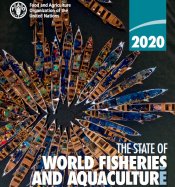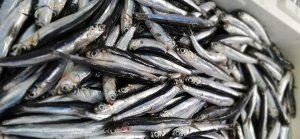 Anne Mette Baek, IFFO's President, shared her views with Peru's National Fisheries Society (SNP) about the marine ingredients industry in the aftermath of the Covid-19 outbreak. You may access the interview that she took with SNP in July 2020 via SNP's website (Revista Pesca Responsable - available in Spanish).
Anne Mette Baek, IFFO's President, shared her views with Peru's National Fisheries Society (SNP) about the marine ingredients industry in the aftermath of the Covid-19 outbreak. You may access the interview that she took with SNP in July 2020 via SNP's website (Revista Pesca Responsable - available in Spanish).
1. What is the current situation of the marine ingredients market worldwide in the midst of the Covid-19 pandemic, which has paralyzed much of the international economy?
The industry has proved resilient in the face of the Covid-19 outbreak. In June 2020 the overall fishing performance of the group of countries analysed in the IFFO reports, which represent around 60% of the annual global supply of marine ingredients, was in line with the 2011-2019 average for the same month.
IFFO’s estimates for the whole 2020 are, as always, based on landings in Peru, which play a major role in determining the global trend. The expectation for the global marine ingredient market is of something slightly above the 2019 output. Global marine ingredients supply should be just short of 5 million mt of fishmeal and around 1 million metric tonnes of fish oil.
2. What are the main changes that are already being seen or will be seen in the future regarding the relationships between producers and buyers of marine ingredients, as a result of the health emergency that the world is going through?
Traceability has been a key requirement for the industry for years since fishmeal and fish oil are internationally traded commodities which sit in a complex value chain involving a wide range of stakeholders. However, the requirement for tracking products – including by-products which now make one third of all marine ingredients – back to their origins is becoming stronger and is driven by consumers. We welcome the initiative taken by standards, such as MarinTrust, the leading standard for marine ingredients, to include a specific clause on traceability back to origins of the products, in the new version of its Chain of Custody standard (which will come into force in November 2020).
3. In the case of Peru, the industry carried out the first anchovy fishing season successfully despite the difficult situation, thanks to the application of strict sanitary protocols. How has IFFO evaluated this process in Peru in favour of the world’s supply of marine ingredients?
IFFO welcomes strict sanitary protocols as a means to not only provide reassurance to buyers and consumers but also ensure safe working conditions. Peru is a leading producer of fishmeal and fish oil and is showing the path towards sustainability and feed / food safety.

4. What lessons could the Covid-19 pandemic have for the global marine ingredients industry?
The industry is complex and suffers from a lack of understanding. We have witnessed the consequences of rumours that affected the salmon sector following a Covid-19 outbreak in Beijing in June. There is a need to provide evidence-based and easy-to-understand knowledge to a wide audience, so that consumers are better able to understand what is behind the products they buy. Throughout the value chain, fishmeal and fish oil producers provide full traceability, which is reflected in a high level of certification: over 50% of all marine ingredients produced worldwide are MarinTrust certified. We keep raising the bar higher and higher as traceability is now a key requirement.
5. What are the future challenges for the global marine ingredients industry facing a “new normal”?
The globalization of fish and fish products implies that the Covid-19 pandemic has brought major disruptions to well-established trade patterns and supply chains. Countries and regions throughout the world, such as the EU for instance, have taken the necessary steps to implement food corridors and enable flows of goods to circulate despite the barriers that were put in place to limit the spread of the virus. However, these measures mean additional paper work and alternative arrangements, that should be time bound. Globalisation has brought more choice to consumers and driven positive change throughout the supply chain, via standardisation and certification programmes, and shouldn’t be given up in the long term.
6. Recently, FAO published its SOFIA 2020 report, what conclusions could IFFO draw from this document regarding the future of the marine ingredients industry?
 The SOFIA report heralds a bright future for our industry, with perspectives for further developments of the aquaculture sector in order to feed a growing population in need of protein. Marine ingredients provide proteins of unmatched profile and should be considered as the strategic ingredients that combine low environmental impacts and high nutritional profile to the benefit of animal growth and then human health: quality feed mean quality food. The FAO report highlights the 78.7 % share of current marine fish landings coming from biologically sustainable stocks and the positive contribution of fishery management science and measures towards stock biomass. According to this report, further growth might come from “improved utilization of the harvest, including reduced onboard discards, waste and losses as driven by legislation or higher market fish prices, both for food and non-food products”. It is expected that the global supply of fishmeal and fish oil might slightly improve over the next decade, although a smaller percentage will come from wild whole fish and more from fish waste and by-products from the processing industry. This message portends a sustainable and resilient supply of marine ingredients for the coming decade.
The SOFIA report heralds a bright future for our industry, with perspectives for further developments of the aquaculture sector in order to feed a growing population in need of protein. Marine ingredients provide proteins of unmatched profile and should be considered as the strategic ingredients that combine low environmental impacts and high nutritional profile to the benefit of animal growth and then human health: quality feed mean quality food. The FAO report highlights the 78.7 % share of current marine fish landings coming from biologically sustainable stocks and the positive contribution of fishery management science and measures towards stock biomass. According to this report, further growth might come from “improved utilization of the harvest, including reduced onboard discards, waste and losses as driven by legislation or higher market fish prices, both for food and non-food products”. It is expected that the global supply of fishmeal and fish oil might slightly improve over the next decade, although a smaller percentage will come from wild whole fish and more from fish waste and by-products from the processing industry. This message portends a sustainable and resilient supply of marine ingredients for the coming decade.
7. What are the main projects that your management at IFFO will promote, and if you have any in the case of Peru?
IFFO’s mission is to represent the industry and help the public understand what its contribution to global food safety is. IFFO developed last year a new set of educational infographics (available in English, Spanish and Chinese) that everyone is free to use. We will continue to develop these materials over 2020. On the technical side, IFFO has commissioned a study to an international team of scientists on biodiversity and impacts that the industry has compared to other industries. Once the results are published in a peer reviewed magazine, which we hope will happen this year, we’ll be able to expand on its findings. The project has demonstrated that to replace fish protein with the current mix of animal and plant proteins would require up to 5.7 million km2 of new land which is about one third of the remaining world’s tropical forests (already heavily depleted). This gives an idea of how efficient marine protein production is in comparison to terrestrial (vegetable) protein, in terms of biodiversity impacts.
8. How do you see the contribution that women have been giving you in this industry that, until a few years ago, was led by men in key positions?
Women definitely have a contribution to make to our sector which, historically, has been dominated by activities considered to be for men only as they involved long stays at sea and highly physical activities. I personally have never experienced any difficulties in being a woman in this sector and I can only praise the many companies which have appointed women at their head, as did Sociedad Nacional de Pesquería (Peru’s SNP), and work hard to achieve gender balance. At IFFO, where staff members are 50/50 men/women, we aim to reflect this in our upcoming events by doing everything we can to feature female and male speakers in balanced proportions. The role of our industry has been evolving over the years with increased interactions throughout the value chain, increased accountability and educational efforts, and we want to be a mirror of our sector.

9. Despite the pandemic, the Peruvian anchovy is moving towards its MSC certification. Is it important for IFFO that this process take place in this and other fisheries?
IFFO follows the Peruvian anchovy move towards MSC certification with attention and satisfaction. We believe in the driving force of certification programmes towards sustainability. Their main goal is to champion best practices. This new achievement will pull the industry up through high level standards in terms of management system, impacts on the ecosystem, and harvest control rules. Over 50% of all marine ingredients worldwide are MarinTrust certified. We welcome all additional certifications that will keep strengthening the achievements and profile of the Peruvian anchovy industry.
The original interview is available here








